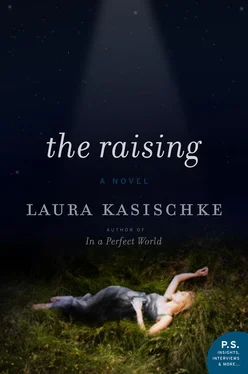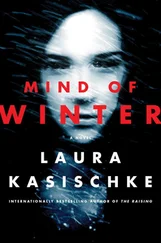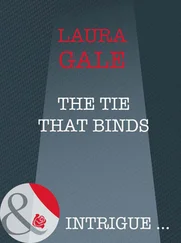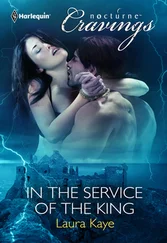Perry stayed behind in the apartment and listened to the stairs make their familiar groaning and rattling sounds as Craig slammed down them in his sneakers on his way to the mailbox. He could even hear the missed beat of Craig skipping over the seventh step.
A week earlier, someone’s foot had punched through that one, and there was a hole in it now that you had to avoid if you didn’t want to end up knee-deep in the stairwell on your way up or down. No one in the building seemed to know who it was who’d gone through it first, but since then, one of the girls next door had twisted her ankle, and she was on crutches, so Perry had left the landlord a message about the problem. When there was no response to that, he left a note at the top and bottom of the stairs himself (“CAUTION, HOLE IN SEVENTH STEP”), and when the girl on crutches found out that Perry was the one who’d put up the sign, she hobbled over with some cookies she’d baked, to thank him for his concern.
The cookies had tasted like cardboard, but she was a pretty girl—bright red cheeks and dyed black hair cut in a kind of bowl shape around her head. If she’d told him her name, Perry had forgotten it. A couple days after Perry taped up the warning, someone had written on the bottom of it, “Signed, Rumpelstiltskin.”
Craig must have fished the mail out of their little metal box by now. Perry could hear him coming back up, taking the stairs two at a time. Maybe three at a time. He could hear what sounded like panting, and then Craig shoved the door open and stood there in the threshold holding another fluttering white postcard out to Perry in one hand, a handful of glossy pizza and sub sandwich flyers in the other.
“It’s her. It’s really her,” Craig said. “It’s another postcard from her.”
Perry took a step carefully toward him and took the postcard from Craig’s hand. It looked the same as the last one—one of those prestamped post office cards made of thin, pulpy paper. Perry looked at the address, reading Craig’s name there, and then he flipped it over.
He had to rub his eyes, and look again, and then rub his eyes again:
The handwriting .
Perry had been seeing that handwriting for years. Soft fat pencil on lined paper. Crayon signatures at the bottom of art projects. Invitations, exclamations pinned to lockers, notes he’d had to borrow, to copy, in Global Studies, in AP English, for classes he’d missed, and poems written out in this handwriting in a poetry workshop he’d taken with her in eleventh grade.
He rubbed his eyes again, but Perry would have recognized those loopy lowercase consonants anywhere, even if he didn’t know exactly the kind of poem she would have written to Craig on a postcard. Mr. Brenner had taught them about slant rhyme. He’d been especially harsh with Nicole (whose poems always rhymed: “What’s the point otherwise?!” she’d said) regarding her “moon/June predilections.”
She’d been a good student. She’d absorbed the lesson completely by the end of the quarter, and gone on to critique her classmates’ poems for exactly the same thing Mr. Brenner had said about hers.
I cannot tell you who I am now
I cannot say how sorry
You did not kill me, Craig, please know
My soul they cannot bury
“Jesus Christ,” Perry said, “Jesus Christ,” as he sank onto the couch, the postcard still in his hand. His heart was slamming against his ribs. He hadn’t been sure before, despite what he himself believed about Nicole and despite all Craig’s insistence. The last postcard had only said, I miss you. N. It could have been from anyone. It could have been a sick prank. Perry had said this to Craig, who’d seemed to take it in, but for the past two days, the way he’d been waiting for the mail, it was obvious he’d only been humoring Perry while waiting for another postcard from Nicole.
“Fuck,” Perry said, and he handed it back to Craig, and then he turned around, heart still slamming, and hands shaking. “Fuck. Fuck. Fuck.”
Until now, he hadn’t believed anything, had he? He’d been unable to believe anything. He’d been on a search for something, but he hadn’t expected to find it.
Now, Perry’s hands were trembling, and he felt his throat all but close in a kind of panicked voicelessness when Craig said, as soberly as Craig had ever said anything, “She’s not dead, Perry. Or. She’s—she’s something. ”
Perry looked up at him, and found himself both shocked and not even surprised to see what he saw:
Craig was happy.
Craig didn’t even seem confused.
Craig had a bright look on his face that Perry hadn’t seen there since before the accident. He looked, Perry thought, like the girls at Confirmation Camp right after the Final Acceptance of Christ into Our Hearts ceremony: shiny-eyed, full of faith, seeing beyond this world and its flimsy trappings. Ecstasy. That look was ecstasy.
He had to tell him. He had to show him the photograph. He had to tell Craig about Lucas, and Patrick Wright, and Professor Polson. Until this, it had seemed too crazy, too cruel. But now—now Craig had to know.
But first, Perry had to call Professor Polson. He had to ask her advice. He had to tell her about this.
“I have to go for a walk,” he said. “I have to clear my head. And I need to call someone. Give me your cell phone.”
“Sure,” Craig said. “Sure. Sure.” Nodding like a lunatic. Smiling like a little kid. He’d have given Perry anything at that moment. If they’d been standing on a rooftop, Craig could have flown right off of it. Not only had he been expiated from the worst crime imaginable—killing the person you love the most in the world—he’d also learned that the dead could come back to life. He handed his cell phone to Perry as he continued to cradle the flimsy postcard in his hands, the way he might an injured bird. He wandered out of the living room with it like a zombie, back to his room, seeming to be laughing and crying at the same time.
Perry didn’t bother to put on his coat. He just turned up the collar of his shirt against the wind and dialed Professor Polson’s phone number as soon as he was out of the apartment house.
Her office phone rang and rang, and finally he hung up before her voice mail clicked in. He’d have to call her at home. He didn’t want to, but he had to know what to do next. Whom else could he ask? Still, he hesitated. The last time he’d called, a couple of days before, Professor Polson’s husband had answered and said she was in the shower, and then hung up without saying good-bye, as if he were pissed that Perry had called.
“Hello?”
It was the husband again.
“Hello. This is Perry Edwards, Professor Polson’s—”
“Work-study,” the husband said. “As usual, she’s not available. I’ll tell her you called again, pal.”
He hung up with what sounded like the receiver slamming against a wall.
Mira hadn’t slept or eaten for a day and a half. For the first half hour, she tried to fake it for her class, but that eventually proved impossible. Every time she stood up from the desk with a piece of chalk and headed for the blackboard, the blackboard telescoped away from her. She wrote the same thing on it twice without realizing that she had:
Bachlabend Perchtennacht
Bachlebend Perchtennacht
She only noticed it when Karess Flanagan pointed out that she’d spelled it differently the second time. Then, Mira had turned around, and, indeed, there it was, misspelled the second time. She had no memory of having written it on the board the first time.
Читать дальше












